Session 7 - Gifts of the Church: How are We Equipped to Accomplish Our Ministries?
Related Media
Session Overview
Session Reading (for self-study students)
Related Topics: Ecclesiology (The Church)
Session 8 - Marks of a False Church and the Government of the Church
Related Media
Session Overview
Session Reading (for self-study students)
Related Topics: Ecclesiology (The Church)
Session 9 - What are the Different Views of the Millennium?
Related Media
Session Overview
Session Reading (for self-study students)
Related Topics: Eschatology (Things to Come), Prophecy/Revelation
Session 10 - The Rapture and the Afterlife
Related Media
Session Overview
Session Reading (for self-study students)
Related Topics: Eschatology (Things to Come), Prophecy/Revelation, Hell, Heaven
APRIL 2013 NEWSLETTER
|
||||||||||||||||||||||||||||||||||||||||||||||||
Bible.org | 1101 E Arapaho Rd Ste 260 | Richardson | TX | 75081
|
Related Topics: Administrative and Organization
What does the Greek word "tetelestai" mean?
Literally translated the word tetelestai means, “It is finished.” The word occurs in John 19:28 and 19:30 and these are the only two places in the New Testament where it occurs. In 19:28 it is translated, “After this, when Jesus knew that all things were now completed, in order that the scripture might be fulfilled, he said, ‘I thirst.’” Two verses later, he utters the word himself: “Then when he received the sour wine Jesus said, ‘It is finished,’ and he bowed his head and gave up his spirit.”
The word tetelestai was also written on business documents or receipts in New Testament times to show indicating that a bill had been paid in full. The Greek-English lexicon by Moulton and Milligan says this:
“Receipts are often introduced by the phrase [sic] tetelestai, usually written in an abbreviated manner...” (p. 630). The connection between receipts and what Christ accomplished would have been quite clear to John’s Greek-speaking readership; it would be unmistakable that Jesus Christ had died to pay for their sins.
Related Topics: Bibliology (The Written Word), Bible Study Methods, Terms & Definitions
Homosexuality Is Unnatural: The Is-Ought Fallacy?
Article contributed by Stand To Reason
Visit Stand To Reason website
Recently a caller to the radio told me about a conversation he’d had about homosexuality. The caller made the teleological argument, that looking at what the natural functions of the male and female reproductive organs are for, we can draw certain conclusions about how they should properly be used. The person he was talking with challenged his argument that you can’t get an “ought” from an “is”. The challenger seemed to be saying that just because it is that way in nature doesn’t mean that we can derive a moral rule from it. The caller asked if the challenge was incorrect and how to respond to it.
On the principle the challenger is correct in describing the is-ought fallacy. But rather than working against the teleological argument, that principle works against a common argument in favor of homosexuality, which is, if homosexual interests are natural to someone, they are therefore morally acceptable. That is an example of an is-ought fallacy.
The is-ought fallacy, first articulated, by David Hume is put simply as you can’t get an ‘ought’ from an ‘is.’ The more precise way of characterizing it is this; You cannot have a syllogism that has a moral term in the conclusion if there is no moral term in the premises. To be a valid argument, the conclusion has to follow from the premises. You can’t have anything in the conclusion that isn’t already set up in the premises. Hume identified this particular fallacy in arguments that were based on mere descriptive elements but had a conclusion with moral terms in it. That is the is-ought fallacy.
People sometimes argue in favor of homosexuality by arguing that their inclination is natural, and if it’s natural, then we shouldn’t be making any moral objections about it. If that is their argument they are guilty of is-ought.
First of all, I’m not entirely sure what they mean by ‘natural.’ If they mean it occurs in nature, then everything is natural. Even concrete is natural because it occurs in nature. So a clarification needs to be made on that particular point. Blindness occurs in nature. Is blindness natural?
It seems like they’re just simply making a description: This is the way it is; therefore it is okay, in the moral sense of the word. They are presuming some moral state of affairs based on a mere description, and that’s an example of the is-ought fallacy.
If they want to work on repairing the flaw in their argument, they’re welcome to try that. It would involve introducing a moral term that can be substantiated into the premise to arrive at a conclusion with a moral term. They might say, “If a thing is natural, then it’s moral. This is natural for me, therefore it’s moral.” Now, there’s a valid argument. I don’t think it’s sound, but at least it doesn’t commit the is-ought fallacy.
Let’s look at the teleological argument based on function. The teleological argument isn’t about just the way a thing works, but the way a thing is intended to work – purpose. My pen functions a certain way. It doesn’t just function that way by accident. It was intended by someone to function with a purpose. For those who are not familiar with this, teleology means ‘end.’ A telos is ‘end’ as in ‘goal.’ Something is intended for a purpose and it’s used for that purpose.
So if I intend to go from Los Angeles to Napa which is north of Los Angeles but I get in my car and head south on the 405 to the 5, and then head down towards the Mexican border, you can see that I am going the wrong direction. But, of course, the word “wrong” here means that I am not moving towards my goal. I am not accomplishing the goal that I intended to accomplish. I am actually moving in a way that’s inconsistent with my goal, and therefore we can call it the wrong direction.
I’m not actually using a moral ‘wrong’ in this particular illustration, but notice how you can understand right or wrong in terms of teleology, depending on what the goal is. If I have a loose screw on the refrigerator and I choose a butter knife to tighten the screw, I’m going to ruin the butter knife because I’m not using it for its intended purpose. It’s not made to function as a screwdriver, even if it can be used that way in a pinch. It will get bent or can slip out and scratch the refrigerator. It wasn’t fulfilling its telos, its purpose, or its function, and therefore it was being used wrongly.
With that as a foundation, let’s look at whether the teleological argument against homosexuality suffers from the is-ought fallacy.
One way of arguing against homosexuality is to say that males were not intended to have sex with other males, and we can tell that by the way sexual organs appear to be intended to function. Because men were not intended to have sex with other males, and they do so, then they are violating their natural teleology, their natural function. But notice that in the nature of the argument we are making a moral claim implicitly up front. We’re saying, We ought to use things the way they were intended by their Maker to be used, consistent with their teleology. This isn’t that way, therefore it’s wrong. It’s not arguing merely on how bodies are naturally, but how they are intended to function naturally. The teleology is the moral term in the premises.
Incidentally, this is the very argument that is being used in the Bible in both the Old Testament and the New Testament regarding homosexuality. In the book of Leviticus, it talks about homosexuality being a capital crime, and an abomination. Leviticus 18:22, “You shall not lie with a male as one lies with a female; it is an abomination.” The purpose of sex is for a man and woman, so it’s abomination when that intended function is violated by homosexual sex.
In Romans 1:26, the New Testament says, “For this reason, God gave them over to degrading passions, for their women exchanged the natural function for that which is unnatural,” that is, different than what God intended. “And in the same way, also, men abandoned the natural function of the woman, and burned in their desire towards one another.” The translation used here is the New American Standard Bible because I think the NIV is woefully inadequate in the way it translates this passage from the Greek.
Paul is saying that when it comes to sexual desire, women were made for men, and men for women, and that’s the functional relationship that God designed them for. They are violating this functional relationship by instead sexually desiring one that was not intended. And, in fact, the wording about male homosexuality is, “They abandoned the natural function of the woman.” So the woman that God provided for them, they are abandoning that for something that, in God’s teleology, is unnatural. So that’s the way our natural law argument works in these two passages.
Of course, this trades on the notion that human beings, in this case, were made for certain ends. And if a person wants to deny God, then we weren’t made for certain ends, and that’s a way to get out of this argument. So does this argument work for people who are not theists?
The appearance of design suggests genuine design. The appearance of teleology suggests genuine teleology, and so examples of teleology in the natural realm point to the existence of God. That’s what a teleological argument for God’s existence amounts to - the argument from design. So the teleology, to me, is evidence for God, and that entails certain moral obligations to the God that created with purpose.
Let’s just say somebody says, “I don’t believe that.” I say, okay, you’re welcome to not believe it, but then you can’t argue teleologically. In fact, you can’t even argue that if it’s natural, it’s okay, because you’re arguing a certain teleology: that if you find it in nature, that means it’s morally acceptable. You can’t help yourself to the teleological argument if you don’t believe in God.
What you ought to be saying if you don’t believe in God is, It’s just molecules clashing in the universe. There is no right and wrong, so you have no justification for claiming that I’m wrong. Now, that would be consistent - the relativistic view of a materialistic universe. But, of course, then they can’t complain their “rights” because rights don’t have any place in a purely naturalistic system. Rights are part of teleology, endowed with creation.
It really is an issue of consistency of worldviews here, as you can see. But I think a more precise understanding of the teleological argument and the is-ought fallacy helps us to answer the original challenge the caller had.
Related Topics: Apologetics, Cultural Issues, Philosophy, Worldview, Homosexuality, Lesbianism, Engage
Interactive Devotionals for Girls
Related Topics: Children's Curriculum
TTP PowerPoint presentations
Available for each course is a PowerPoint presentation with anywhere from 300 to 600 slides. These presentations are downloadable individually from the their store and they are also included with the Leader's Notebooks for each course. They contain extensive leader's notes designed for those who teach The Theology Program (TTP), use the material in their lessons, lead a TTP small group, or can be valuable further aid to students of TTP. See below for further description.
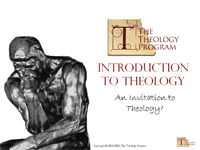
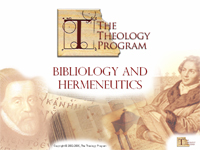

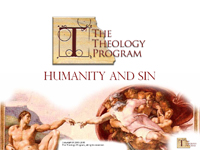


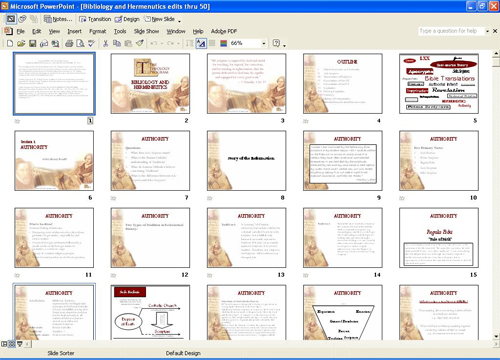 Each TTP PowerPoint presentation comes with hundreds of high quality slides with text, illustrations, graphs, and graphics to aid in the the student and the teacher, giving them a visual of the subject being taught.
Each TTP PowerPoint presentation comes with hundreds of high quality slides with text, illustrations, graphs, and graphics to aid in the the student and the teacher, giving them a visual of the subject being taught.
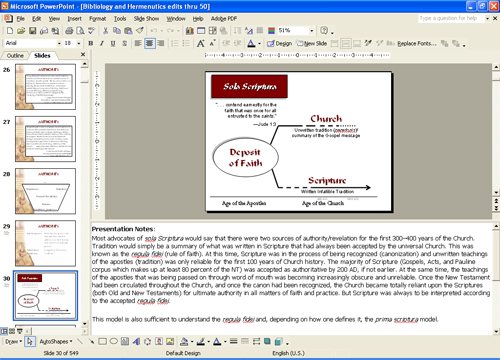 The leader's notes are viewable in edit mode of the presentation (the defalt mode that PowerPoint opens in). Most of the slides contain their own notes that pertain to the slide in view. Included in the leader's notes are lesson objectives for each session, presentation notes that give further information about the subject explaining the concepts of what is being taught, suggested illustrations to use for the subject, and references for further study.
The leader's notes are viewable in edit mode of the presentation (the defalt mode that PowerPoint opens in). Most of the slides contain their own notes that pertain to the slide in view. Included in the leader's notes are lesson objectives for each session, presentation notes that give further information about the subject explaining the concepts of what is being taught, suggested illustrations to use for the subject, and references for further study.
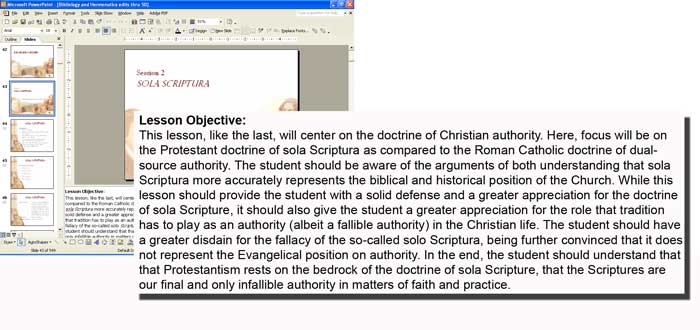
Click here to download the Introduction to Theology PowerPoint for free.
Lesson 1: The Changes of the Gospel (Philemon 1-25)
Related MediaThe story is told of two brothers, convicted of stealing sheep, who were branded on the forehead with the letters ST, to indicate “sheep thief.” One brother couldn’t bear the stigma. He became bitter and moved away, never to return.
The other brother chose a different course. He said, “I can’t run from what I did, so I’ll stay here and win back the respect of my neighbors.” As the years passed, he built a solid reputation for integrity. One day a stranger saw him, now an old man, with the letters still on his forehead. He asked a townsman what they signified. “It happened a long time ago,” said the villager. “I’ve forgotten the particulars, but I think the letters are an abbreviation for ‘saint’” (adapted from “Our Daily Bread,” Aug., 1982).
Although there is no mention in the story that the cause of the thief’s transformation was the gospel, it illustrates how the gospel does in fact change everyone that it saves. As Paul wrote (2 Cor. 5:17), “Therefore if anyone is in Christ, he is a new creature; the old things passed away; behold, new things have come.” “But thanks be to God that though you were slaves of sin, you became obedient from the heart to that form of teaching to which you were committed, and having been freed from sin, you became slaves of righteousness” (Rom. 6:17-18). These verses state what the story of Philemon and Onesimus illustrates, that…
God changes every person whom He saves through the gospel.
Philemon is Paul’s shortest and most personal letter, written during his first imprisonment in Rome. Philemon, the main recipient of the letter, was a wealthy man from Colossae, near Laodicea, about 100 miles inland from Ephesus, which was on the west coast of modern Turkey. The letter was also addressed to Apphia, who was probably Philemon’s wife; to Archippus, who may have been the pastor of the church there (some think he was the son of Philemon and Apphia); and to the entire church that met in Philemon’s house. (There is no record of a church building until the third century.) Paul had not visited Colossae, although he hoped to do so soon (v. 22). But somehow, perhaps during Paul’s ministry in Ephesus, he had come into contact with Philemon and led him to Christ (v. 19).
Being wealthy, Philemon owned slaves. The New Testament never directly attacks the institution of slavery. If it had done so, as one author points out, “Christianity would have sunk beyond hope of recovery along with such revolutionary attempts; it might have brought on a new slave rising and been crushed along with it” (W. Bousset, cited by R. P. Martin, Zondervan Pictorial Encyclopedia of the Bible [Zondervan], ed. by Merrill C. Tenney, 4:755). But, as F. F. Bruce pointed out, “What this epistle does is to bring us into an atmosphere in which the institution could only wilt and die” (ibid.).
One of Philemon’s slaves was named Onesimus. He had stolen from his master and run away. In the Roman Empire, masters had absolute authority over slaves and they often tortured or killed them for minor offenses or mistakes. So Onesimus was a fugitive slave, under a capital offense.
In his travels, God providentially led Onesimus all the way to Rome, where he crossed paths with the apostle Paul. We don’t know whether he was imprisoned with Paul for a time or how they met. But the Hound of Heaven was pursuing Onesimus! Although he had undoubtedly heard the gospel in Philemon’s household, he ran from the place where he easily could have been saved. He traveled hundreds of miles to a large city where he “happened” to meet Paul. When Paul shared the gospel, God opened Onesimus’ heart and he trusted in Christ. He then stayed with Paul and the two men formed a close relationship as Onesimus served Paul (vv. 10-13).
In time, as Onesimus grew in the faith through Paul’s teaching, he realized that he needed to return to his master and make restitution for the crimes that he had committed. The fact that we have this letter to Philemon is proof of the genuine nature of Onesimus’ conversion. If he had been a false convert, he would have taken off for some other hiding place and never returned to Philemon. This short letter is Paul’s appeal to his friend, Philemon, and to the entire church, to welcome back this runaway slave, not as a second-class citizen, but as a beloved brother in Christ.
Paul’s task was not easy. He had to convince a man and an entire church that was immersed in the cultural acceptance of slavery to set aside that cultural viewpoint and to practice the Christian truth that all people are equal in Jesus Christ (Col. 3:11 also enforces this). This would be like trying to convince a slave owner and a white church in the South before the Civil War to accept a returning runaway black slave as a member in full standing! Paul could have asserted his apostolic authority, but he wanted to secure Philemon’s obedience from the heart. While not denying Onesimus’ crime, Paul wanted Philemon, his wife, and the entire church to forgive him completely. He wanted mercy to triumph over raw justice. He also wanted to leave the door open for Philemon to free his slave, so that perhaps Onesimus would choose to return to Rome and continue his ministry to Paul.
There are several ways to approach this letter. Next time I want to examine it for what it teaches us about the art of good relationships. But today, rather than giving a detailed, verse-by-verse exposition, I want to focus on how God changes us through the power of the gospel: He changes our character, our relationships with others, and our relationship with Him.
1. God changes your character when He saves you.
Everyone in this story is behaving differently than he would have before meeting Jesus Christ. These changes are not automatic or this letter would not have needed to be written. They require constant, lifelong work. I will limit myself to Paul and Onesimus:
A. God changed Paul’s character.
This letter oozes with Paul’s gentleness, graciousness, and sensitivity. In verses 4-7, he commends Philemon in a loving and gracious manner, describing how his own heart has come to have much joy and comfort in Philemon’s love. He goes on to appeal to him as a brother in Christ (vv. 8, 10), urging Philemon (v. 17), “If then you regard me a partner, accept him as you would me.” He gently adds (v. 20), “Yes, brother, let me benefit from you in the Lord; refresh my heart in Christ.”
You may be thinking, “Yes, of course, this is the apostle Paul. What do you expect?”
But you may be forgetting what Paul was like before he met Christ. When the Jews stoned the innocent Stephen, Paul watched this gruesome spectacle in hearty agreement (Acts 8:1). Then he “began ravaging the church, entering house after house, and dragging off men and women, he would put them in prison” (Acts 8:3). He was “breathing threats and murder against the disciples of the Lord” (Acts 9:1). He describes himself during this time as being “a blasphemer and a persecutor and a violent aggressor” (1 Tim. 1:13). He wasn’t a nice man! To call him an angry young man would be an understatement. But, here he is, about 25 years later, a gentle, humble, gracious man, urging others to love and kindness.
Don’t miss Paul’s mention of Mark as one of his fellow workers (v. 24). On the first missionary journey, Mark had abandoned Paul and Barnabas. Later, when Barnabas wanted to give Mark a second chance, Paul adamantly refused, leading to a split between these two men of God. Barnabas took Mark and worked with him until Mark became a faithful man of God. As Paul grew in grace and gentleness, he came to see Mark as useful for service (2 Tim. 4:11). Paul’s change of heart towards Mark shows how God changed the apostle over the years as the fruit of the Spirit grew in his life.
Maybe before you met Christ, you were an angry person. You had a reputation for having a short fuse. But, as you learn to walk in the Spirit, not the flesh, you should see “love, joy, peace, patience, kindness, goodness, faithfulness, gentleness, and self-control” (Gal. 5:22-23) replacing outbursts of anger and arguments (Gal. 5:20). You learn to put off the sinful ways of the old man and put on the godly ways of the new man in Christ.
B. God changed Onesimus’ character.
Onesimus had not been a Christian as long as Paul had been, but there were already some major changes in his character. Formerly, he had grudgingly served Philemon, doing only the bare minimum, and stealing everything he could as he looked for an opportunity to escape. But now in submission to the Lord, he returns to his master, ready and willing to render whatever service is required of him. Formerly, Paul says that Onesimus, whose name means “useful,” was useless to Philemon (v. 11). He was not a good worker. But now, he truly lives up to the meaning of his name, both to Philemon and to Paul.
This can only mean that God had changed Onesimus’ attitude. Before, he resented his lot in life as a slave. He hated his master and he hated his master’s God. But now, he was in submission to God to the extent that he was willing to give up his freedom, go back and place himself under his master’s authority. Instead of being a surly, angry slave, he now was a helpful, cheerful servant. God had changed Onesimus’ attitude through the gospel.
Has He changed your attitude? Teenager, has God changed you from grumbling and snapping at your parents to cheerful compliance from the heart as you seek to please them? Men and women, has God changed the way that you act on the job? Before, you did the bare minimum to keep your job, grumbling with other employees about the way the management treated you. Now, you excel with a joyful spirit of obedience, doing your job as unto the Lord. At home, before you met Christ, you were selfish and insensitive, exploding in anger if the rest of the family didn’t do things your way. Now, you are patient and kind towards them. You think about their needs and seek to serve them.
About fifty years after Paul wrote this letter, Ignatius, the bishop of Antioch, was being taken to execution in Rome. At a stopover in Smyrna, he wrote to the church of Ephesus and commended their bishop, whose name was Onesimus (Apostolic Fathers [Harvard University Press], translated by Kirsopp Lake, 1:166, 175). While we cannot positively identify him as the once-runaway slave, it is possible that God used this once useless slave in a mighty way as a servant of His church (see, also, William Barclay, The Letters to Timothy, Titus, and Philemon [Westminster Press], rev. ed., p. 275). If God has saved you, He changes your character to make you useful in His service.
2. God changes your relationships with others.
This is an extension of changed character, of course. When you change from being hostile to gentle, from rebellious to submissive, and from being self-serving to serving others, it is bound to affect your relationships. Philemon illustrates two basic relational changes:
A. God changes you from alienation to reconciliation with others.
When Onesimus absconded with Philemon and Apphia’s money and some of their personal belongings, they were no doubt angry. They probably complained, “After the nice way that we treated him, he ripped us off! That ungrateful wretch!” And, Onesimus probably didn’t have the warm fuzzies when he thought about Philemon and Apphia. “They live in ease and luxury while we slaves work our fingers to the bone! It’s just not fair! Sure, I stole a few things, but they’ve still got more than plenty left!”
How can a relationship as strained as that ever be reconciled? Only by the power of God through the transformation of the gospel. One key evidence that a person is born again is when he wants to repair broken relationships and to make restitution for past wrongs. Jesus emphasized this in the Sermon on the Mount. After talking about the seriousness of the sin of anger, Jesus said (Matt. 5:23-24), “Therefore if you are presenting your offering at the altar, and there remember that your brother has something against you, leave your offering there before the altar and go; first be reconciled to your brother, and then come and present your offering.”
You can’t worship God properly until you first do all that you can to be reconciled with the person who has something against you. While it takes time and effort, if you do not work at repairing strained relationships, it may indicate that you are not right with God (Matt. 18:21-35). Reconciled relationships are a big deal to God! They should be a big deal to us, also!
B. God changes you from relating to others on the basis of social status to relating as family.
Formerly, the relationship between Philemon and Onesimus was strictly master-slave. But now it had a new dimension: brother to beloved brother (v. 16). We don’t know whether Philemon freed Onesimus immediately or not, but even if he did not, they had a new basis for relating to one another. Perhaps in the church, Philemon even served communion to Onesimus. Perhaps Onesimus on occasion opened the Scriptures and taught the church the things that the beloved apostle Paul had taught him, as Philemon listened attentively. The gospel erases social class distinctions and puts us in relationship as members of the family of God. Included with social class distinctions, there is no place for any racial discrimination in the church of Jesus Christ!
Years ago, my Uncle John was an enlisted man in the National Guard. A colonel in his unit also belonged to the same church that my uncle belonged to. On some occasions when the colonel saw my uncle in the mess hall, he invited him to come over and join him for lunch. They would have a good time chatting together. After the meal, the colonel often said, “Here, let me get your tray.” He would carry my uncle’s dirty dishes to the window. The other men would gawk and say among themselves, “That guy must have something on the colonel!” He did: they were brothers in Christ!
I should add that when it came to performance on the job, my uncle respected the colonel’s rank and authority. He showed him proper respect and obeyed his orders. While at church or in social settings, your boss is your brother in Christ, on the job he is still your boss. You must show proper respect and serve him all the more because he is a brother (1 Tim. 6:2).
Thus God changes every person whom He saves through the gospel. He changes your character and He changes your relationships with others.
3. God changes your relationship with Him.
Martin Luther wrote, “We are all the Lord’s Onesimi” (cited by H. C. G. Moule, Colossian and Philemon Studies [Christian Literature Crusade], pp. 302, 315). What he meant is true—that this little book beautifully illustrates the salvation that every believer enjoys.
God created you to serve Him. He is your rightful owner and master. But, like Onesimus, you rebelled against Him. You said, “I will not have this Master to rule over me.” And so you took the body, the intelligence, and the talents that God had entrusted to you to use for Him and squandered them on yourself. Claiming to be free from God, you became the slave of sin. Like Onesimus, you were a condemned fugitive on the run, useless to your rightful Master, guilty, and indebted to Him. You had robbed God.
But even as God had His sovereign hand on Onesimus, so with you. In due time, while you were deliberately running in the opposite direction, He providentially led you across the path of someone who shared the gospel with you. At first, you were fearful of dealing with God, because you knew that you were guilty and condemned. You thought, “How could I possibly return to God and stand before Him in light of the things that I’ve done?”
Then the Savior said, “Don’t plead your own case. Don’t say a word on your own behalf. Don’t attempt to justify yourself. You are guilty as charged. Just give the Master this letter.” You looked down and read (v. 17), “… accept him as you would me.” “But, how can He do that? What about all the wrongs that I committed toward Him?” You kept reading (v. 18), “But if he has wronged you in any way or owes you anything, charge that to my account.”
Maybe you had heard it before without understanding, but suddenly He opened your blind eyes and it made sense. You never could hope to pay God for all of the sins that you have committed. But you don’t have to! Christ paid your debt on the cross. Everything that you stole and all the back wages that you owe were charged to His account. You put your trust in the Savior who paid the debt that you owed. You returned to the Master and willingly put yourself under His lordship. For the first time in your life, you were truly free! Now, you live to please Him and do His will from the heart. And to your amazement, the blessed Lord Jesus, who paid the debt you owed, is pleased to call you his beloved brother or sister, just as Paul refers to the slave, Onesimus (v. 16)!
Conclusion
Perhaps you’re thinking, “That’s all well and good for someone who has a rough background, who has done a lot of terrible things. But I’m not like that. I’ve always been a basically good person. I’ve always gone to church. I’m not like this runaway slave.” If you’re thinking that, then consider this story.
Some years ago, a church in England was having a combined communion service with one of its mission churches. The pastor noticed that a former burglar was kneeling at the communion rail beside a judge of the Supreme Court of England, the very judge who, years before, had sentenced that burglar to seven years in prison. After his release the burglar had been converted to Christ and had become a Christian worker.
After the service, as the judge and the pastor walked home together, the judge asked, “Did you see who was kneeling beside me at the communion rail?” “Yes,” replied the pastor, “but I didn’t know that you noticed.” The two men walked on in silence for a few moments, and then the judge said, “What a miracle of grace!” The pastor nodded in agreement, “Yes, what a marvelous miracle of grace!”
Then the judge said, “But to whom do you refer?” The pastor replied, “Why to the conversion of that convict.” The judge said, “But I was not referring to him. I was thinking of myself.”
“What do you mean?” the pastor asked. The judge replied, “That burglar knew how much he needed Christ to save him from his sins. But look at me. I was taught from childhood to live as a gentleman, to keep my word, to say my prayers, to go to church. I went through Oxford, took my degrees, was called to the bar and eventually became a judge. Pastor, nothing but the grace of God could have caused me to admit that I was a sinner on a level with that burglar. It took much more grace to forgive me for all my pride and self-righteousness, to get me to admit that I was no better in the eyes of God than that convict whom I had sent to prison.”
Has God opened your eyes to see that you are just as needy of the Savior as that convicted burglar or as Onesimus, the runaway thief and slave? Have you trusted in Christ’s shed blood to pay the debt that you rightfully owe?
If you have trusted in Christ, are you allowing His grace to change you? Is your character becoming less angry and more patient, kind, gentle, and loving? Is your attitude toward authority becoming more submissive, even when you’re mistreated? Is your life changing from self-centered uselessness to becoming a useful servant to others as you serve Christ?
What about your relationships? Are you working at being reconciled to those from whom you are alienated, as much as it depends on you? Have you sought forgiveness and made restitution to those you have wronged? Would those who formerly knew you as a sheep thief now think that the ST on your forehead must be an abbreviation for saint?
Application Questions
- A person who professes to know Christ, but who has an angry temper, asks, “How can I change?” Your answer?
- How can you know whether or not God wants to change something in you? Is there a difference between immaturity and sin?
- Why is change so difficult? Why doesn’t God usually change us instantaneously rather than gradually?
- Think about this question as it relates to you (not to anyone else!): “What shortcoming or sin does God most want to change in me?” And, “what do I need to do to work on it?”
Copyright, Steven J. Cole, 2007, All Rights Reserved.
Unless otherwise noted, all Scripture Quotations are from the New American Standard Bible, Updated Edition © The Lockman Foundation
Related Topics: Basics for Christians, Discipleship




















